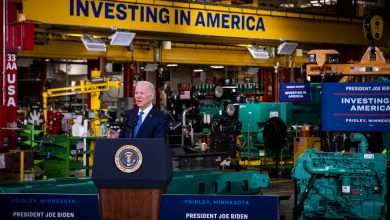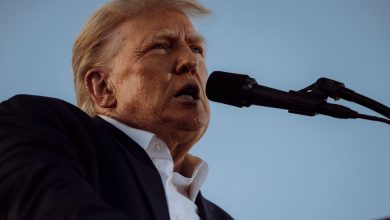Elon Musk, After Toying With Twitter, Now Wants It All

For the past two weeks, Elon Musk has made it clear he wants to own a piece of Twitter. First, he revealed that he bought 9 percent of the company. Then he toyed with joining its board of directors. And then he backed out, while tweeting a string of insults about Twitter to his 81 million followers. But on Wednesday night, he made his boldest move yet: He said he wanted to buy the whole company.
Mr. Musk’s unsolicited bid, which could be worth more than $40 billion, could have a big impact on political discourse around the world because he strongly supports unfettered free speech and has bristled when Twitter has removed posts and barred users.
In a statement, Twitter said it would “carefully review the proposal.” But after a board meeting that started early Thursday morning and lasted several hours, Twitter’s executives and directors seemed ready for a fight. They appeared to be marshaling investors against Mr. Musk’s plans, and signaled that he would have to spend billions more if he wanted to own the company.
Twitter is also considering a corporate defense tactic to fend off Mr. Musk. It is weighing putting in place a so-called poison pill, a maneuver intended to ward off an unwanted takeover offer by making the target’s shares more expensive, said two people who were familiar with the matter but could not speak for the company.
Mr. Musk said that if he succeeded in acquiring Twitter, he intended to relax the company’s moderation policies and make public its algorithm for ranking content, which controls what hundreds of millions of people see in their Twitter feeds.
“Twitter has become kind of the de facto town square, so it’s really important that people have the reality and the perception that they are able to speak freely within the bounds of the law,” Mr. Musk said in an interview on Thursday at a TED conference in Vancouver, British Columbia.
Conservatives, who complain that Twitter is biased against them, celebrated Mr. Musk’s offer. “Musk has made clear that in order to be saved, Twitter needs a wholesale tear-down to the foundation — its leadership must be removed,” said Jason Miller, a longtime aide to former President Donald J. Trump, who was barred from Twitter in 2021. Mr. Miller is also the chief executive of a right-wing Twitter alternative, Gettr.
But it was unclear if Mr. Musk’s takeover bid and plan to turn the publicly traded Twitter into a private company will work, and he provided few details about how he would pay for it. Some investors and Wall Street analysts said that his offer of $54.20 a share was too low, and that he would need to go to at least $60 a share to appeal to shareholders. That would be 25 percent higher than the share price when Mr. Musk announced this month that he had acquired a 9 percent stake in Twitter.
“You’re not at some garage sale bidding on a lamp,” said Brent Thill, an equity analyst at Jefferies. “It’s a service that is beloved by many throughout the world, and you can’t just make these quick actions.”
Some shareholders also dismissed Mr. Musk’s offer. Prince Al Waleed bin Talal of Saudi Arabia, who described himself and the conglomerate he represents as one of Twitter’s largest and most long-term shareholders, said in a tweet that Twitter should reject the offer because it was not high enough to reflect the “intrinsic value of Twitter given its growth prospects.” Others said that the offer was sufficient but that Mr. Musk’s proposed changes could spark an advertiser exodus and hurt the value of the company.
Twitter’s share price was down 1.7 percent when trading ended on Thursday, closing at $45.08 — significantly below Mr. Musk’s offer.
Mr. Musk, who already is the chief executive of the electric carmaker Tesla and the rocket company SpaceX, was candid that his bid could fail. “I do think this will be somewhat painful, and I’m actually not sure I’ll be able to acquire it,” he said. But he pressed Twitter’s board for a shareholder vote, saying in a tweet that doing otherwise would be “utterly indefensible.”
A Twitter spokesman said the board would “carefully review the proposal to determine the course of action that it believes is in the best interest of the company and all Twitter stockholders.”
The poison-pill defense being considered by Twitter is a common tactic. It essentially lets a takeover target flood the market with new shares or allow existing shareholders other than the potential acquirer to buy shares at a discount — making an acquisition more expensive.
Should Twitter put such a measure in place, Mr. Musk could take his bid directly to shareholders with a so-called tender offer. If they like Mr. Musk’s offer, they could sell their stock to the billionaire, allowing him to gain control of the company.
The board is also considering soliciting offers from other companies that may want to acquire Twitter, one of the people familiar with its plans said, another common move among takeover targets. It was not clear if Twitter had approached anyone yet.
A deal could require Mr. Musk to obtain $15 billion to $20 billion in debt financing, said Dan Ives, an analyst at Wedbush Securities. Though Mr. Musk is the wealthiest man in the world, much of his worth is tied up in Tesla shares.
Twitter could question Mr. Musk’s ability to finance the deal or claim it undervalues the company. The offer is a 54 percent premium over the share price the day before he began investing in the company in late January. But shares of Twitter traded higher than Mr. Musk’s bid for much of last year.
When Mr. Musk announced his stake in Twitter, several board members welcomed him, including Twitter’s co-founder Jack Dorsey. Twitter offered Mr. Musk a seat in its boardroom, a move that executives hoped would prevent him from publicly criticizing the company. But the welcome quickly soured. Mr. Musk turned down the board seat.
By Wednesday, Mr. Musk was ready to disclose his next move. In a message to Bret Taylor, the chairman of Twitter’s board, Mr. Musk said: “I believe in its potential to be the platform for free speech around the globe, and I believe free speech is a societal imperative for a functioning democracy,” according to a filing with the Securities and Exchange Commission that was later made public. “Twitter needs to be transformed as a private company.”
Mr. Taylor, a co-chief executive of Salesforce, has served on Twitter’s board since 2016, when Salesforce considered buying Twitter. Mr. Taylor joined Salesforce a year later, after it acquired his own company, Quip.
Another important board member is Egon Durban, a co-chief of Silver Lake, a private investment firm. Mr. Durban joined Twitter’s board in 2020 as part of a deal the company struck with another activist investor, Elliot Management, which wanted to shake up leadership. Mr. Dorsey is friendly with Mr. Musk, but he is set to leave the Twitter board next month.
Mr. Musk has not said exactly what he would do with Twitter, the product. But in private conversations, he has proposed a version of Twitter where moderating objectionable content is a thing of the past, according to a person who has spoken with Mr. Musk in recent days.
But that vision is light on details. When challenged on how Twitter should deal with violent or oppressive speech, Mr. Musk has been dismissive. He proposed limiting moderation to tweets that were “a crime” according to U.S. law during his TED interview on Thursday.
Twitter forbids a variety of speech on its platform, including spam, violent threats, coordinated disinformation campaigns and the sharing of private information. It has also cracked down on misinformation about the outcome of elections and the Covid-19 pandemic.
Many Twitter employees have vocally protested Mr. Musk’s involvement in the company since his investment was announced in early April, arguing that he would shift the company culture and damage its efforts to control problems like bullying, threats and misinformation on the platform. Others have noted he isn’t always for free speech, and has cracked down on outspoken Tesla employees and an account that followed the movements of his private jet.
In an emergency all-hands company meeting on Thursday afternoon, Twitter’s chief executive, Parag Agrawal, sought to calm employees and said that “I don’t believe we are being held hostage” by Mr. Musk. He was asked why he wasn’t tweeting more to counter Mr. Musk’s frequent criticism.
Employees pressed Mr. Agrawal on when and how the board would make a decision. He demurred, saying that the board would be rigorous but that he could not share more about the process. He warned employees that they would hear more about the board’s eventual decision on Twitter itself, rather than from leadership.
Mr. Agrawal also faced questions about what an acquisition by Mr. Musk would mean for the company’s culture and for employees’ stock compensation. Mr. Agrawal urged employees to focus on things within their control and said he would do the same.
“I believe Twitter stands for way more than one human, any human, me or anyone else, and their values. Twitter stands for open, public conversation,” he said. “It is best defined by everyone who uses the service.”
Jeremy W. Peters contributed reporting.





